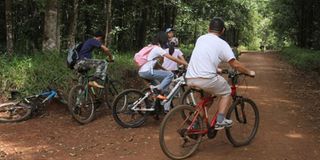Time to rename Karura Forest after Prof Wangari Maathai

Nature lovers cycling in Karura Forest in 2018. PHOTO | FILE | NATION MEDIA GROUP
What you need to know:
- Today, it impossible to run a mile without bumping into tens of mask-wearing Kenyans walking, running, taking selfies and a father teaching his boy how to cycle.
- It is a pity that it took most of us a pandemic to discover these sanctuaries that are usually almost empty when bars, restaurants and hotels remain packed.
There is something about Karura Forest. Maybe it is the peace and quiet that engulfs you once you set foot into the maze of the nature trails. Or perhaps the comforting cover of the canopies that protect you from the sun.
It could be the occasional troop of cheeky monkeys hopping from branch to branch intermittently crossing the forest highways from one end to the other. It is definitely the isolation of the forest that allows you to think, reflect, plan and re-energise.
From the moment I walked into Karura Forest for the first time in early March 2013, the forest has become a central part of my social life. It is nearly impossible to plan a weekend without including a walk or a run in the forest.
PANDEMIC
In the era of the coronavirus pandemic, Karura Forest has become an instant source of comfort and recreation to tens thousands of Kenyans. What was once a mildly populated parking lot on a typical Saturday or Sunday morning, is now teeming with cars as Kenyans seek a break from staying indoors all week. Before the pandemic, it was not unusual for me to run for nearly one hour without encountering a fellow runner.
Today, it impossible to run a mile without bumping into tens of mask-wearing Kenyans walking, running, taking selfies and a father teaching his boy how to cycle.
Even in trails that I had previously identified as isolated — with less human traffic — have been explored by Nairobians seeking an adventure.
It has been such a delightful experience to watch Kenyans come in tropes, young families bond over a cycling experience and lovers taking romantic strolls.
STAYING INDOORS
But it also reminded me of the sheer importance of public spaces like Karura Forest, the Arboretum, City Park, Uhuru Park and others, which I imagine must also be full to the brim with Kenyans who are tired of staying indoors.
It is not lost on me, that I would not be enjoying a run or a walk in the forest were it not for Prof Wangari Maathai, who fought hard and sacrificed so much to protect these spaces.
Every time I take my usual trail, I cannot help but think that this could have been one massive concrete jungle or some fancy office park if Wangari Maathai had not put her foot down and stood against an entire government with unmatched boldness and uncommon resilience. It was in this forest, that Prof Maathai was battered and shed her blood alongside fellow Kenyans against a group of people who wanted to grab the forest.
Sometimes, I don’t think we fully appreciate what it means to live in a city and have full access to public places like forests and parks, seven days a week, charging close to nothing complete with bathrooms and safe trails.
It is a pity that it took most of us a pandemic to discover these sanctuaries that are usually almost empty when bars, restaurants and hotels remain packed.
My feeling is that when things return to normal —and I write this advisedly — that some of us will have our trails to ourselves and people will return to spending their Sunday afternoons in noisy bars and restaurants. I also don’t think that we appreciate what these forests represent and the fact that these public spaces are a monument of the courage of those who came before us.
SACRIFICE
My assumptions aside, the more I think about these public spaces, the more I get convinced that we may not have honoured those who fought for these spaces that we enjoy today so cavalierly.
For all her effort and sacrifice, Wangari Maathai remains one of the most under-recognised and under-appreciated luminaries of our time. We must change this.
Maybe it is time for us to think about posthumously honouring Wangari Maathai in the way she truly deserves. As we celebrate the tenth anniversary of her death — in September next year — we should honour her and rename Karura forest to ‘Prof Wangari Maathai Forest’ so that it serves as a daily reminder to Kenyans of the sacrifice she made on our behalf.
More importantly, there couldn’t be a greater honour to Wangari Maathai than remaining protective of our forests. Like my clever friend remarked last Sunday, it is good that Kenyans have discovered Karura Forest, so that should any cheeky politician thinking about grabbing even an inch of that great sanctuary, we are sure to have a battalion of fit and energetic Karura-loving Kenyans protesting on the streets!
The writer is the director of the Innovation Centre at Aga Khan University Graduate School of Media and Communications. The views expressed in this column are hers; [email protected]





